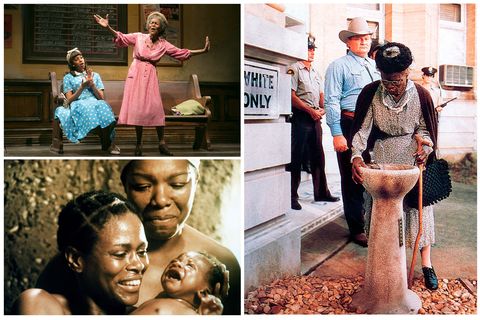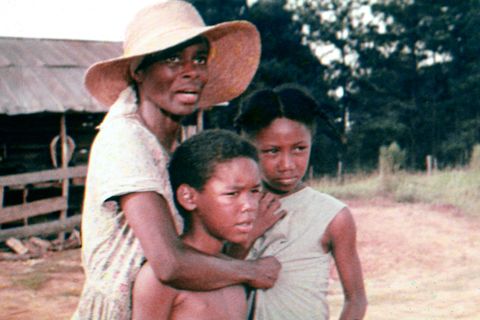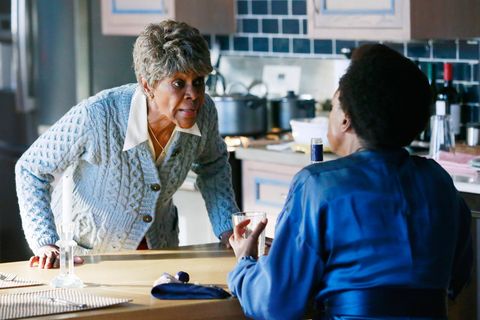On Thursday January 28, 2021, Cicely Tyson passed away at the age of 96. Below, a conversation between Tyson and Viola Davis from the November 2017 issue of ELLE.
In Cicely Tyson’s groundbreaking role in the 1974 television movie The Autobiography of Miss Jane Pittman—for which she won two Emmys (Actress of the Year and Best Lead Actress in a Drama)—she played a woman who was born into slavery and lived to participate in the civil rights movement in 1962 at the age of 110. Today, the life and career of Tyson, now 92, encompasses a similarly grand arc set against the most recent century of American history.
Since landing her first film role back in 1957, Tyson’s monumental catalog of work has spanned six decades and counting: She’s starred in plays ranging from 1969’s To Be Young, to the 2013 revival of The Trip to Bountiful, for which she won a Tony. Her work on the small screen covers the TV era in full, from 1960s shows such as Naked City and Guiding Light through House of Cards and beyond; she was also nominated for an Emmy for portraying Binta, Kunta Kinte’s mother, in the epochal 1977 miniseries Roots. And on the big screen, Tyson has starred in more than two dozen films, including The Heart Is a Lonely Hunter (1968); Sounder (1972), for which she was nominated for a Best Actress Oscar; Fried Green Tomatoes (1991), in which she played the story’s secret heroine, Sipsey; several of Tyler Perry’s blockbuster comedies; and the 2011 megahit The Help, in which Tyson costarred with Viola Davis—on whose epic TV series, How to Get Away With Murder, she has also appeared as Davis’s mother.
ELLE invited Davis, herself a legend in the making, to interview Tyson about her life and her award-festooned acting achievements.
Viola Davis: Hey, you!
Cicely Tyson: I’m going to be hysterical all through this interview, because I cannot believe it’s actually happening! [Laughs]
VD: Well, you know what, it’s going to! My first question: Sounder and The Autobiography of Miss Jane Pittman provided you with two of your most trailblazing roles. Does one loom larger as a personal achievement?
CT: Actually, I’m torn. They both made such an impact on my life. Of course, Sounder surprised us all. I remember [director] Marty Ritt calling me and saying, “Cis, this is supposed to be a children’s film. But if they’re not careful, they’re going to make a damn good film.” And he was absolutely right. That movie was, for me, the first acknowledgment that I could do something that would move people. As far as Jane Pittman, I don’t know that I could verbalize, to this day, what I felt once I got into that role. I did a tremendous amount of research. I need to feel as though I am in the person’s skin. I was scared to death—I knew there were some aspects of that woman’s life that I could probably handle, but there were others that I didn’t know. So I called the producers, and I said, I want to visit an elders’ home to be among people who might have been peers of this woman. I spent a good deal of time talking to them, watching them, feeling them, hoping that I could capture their lives. I guess the rest is history.
Are there any roles that you wish you could do over again?
I wish I could do everything over again! [Laughs] That’s why I don’t watch them. The gratification comes, for me, in the doing of it. And once I’ve done it, I can’t do anything about it if it’s good or if it’s bad. So I don’t torture myself.
Have there been any women in particular who influenced your career?
Yes. At the very beginning of my career, I had a teacher whose name was Vinnette Carroll; she directed a number of Broadway shows. She kept saying to me, “You know the problem with beautiful women? They tend to rely on their beauty.” And I said, How wrong she is! I never think of myself as being beautiful. I thought, What are you talking about? I work so hard. And I did. But I learned from her how important it is to learn your craft. When all else fails, you will land on that, and that alone.
Absolutely. Have you ever had to stand up to a director?
[Laughs] Yes, and it wasn’t too long ago! And it was because I was being asked to do something that I knew I was not going to do. It became quite an incident—though not boisterous in any way. I said, “There isn’t anything that I find important in what you’re asking me to do.” Finally, it was worked out, but they weren’t happy about it. I did the show, and I was nominated for an Emmy. [Laughs] So you never know. I can’t go against my grain.
Exactly. And what made you want to be an actress?
I didn’t want to be an actress; I never thought of being an actress because as children there were three of us—I was the middle child—and we spent our time in church from Sunday morning to Saturday night. Any movies we saw were shown in our church on Thursday night, when they put up a bed sheet and got a projector. Plus, I was too shy. If I were in a room with you for this length of time, the best you would get out of me was, “Hello. How are you? I’m fine, thank you.” That would be it. Although we performed in church all the time—myself, my sister, my brother. I played the organ, I
played the piano, I sang in the choir. The church was really where, subconsciously, I was sopping up all of this—whatever I use now—to perform.
Wow, that’s awesome. How do you feel about being called a “legend” and an “icon”?
A legend and an icon are old people. [Laughs] A legend is somebody who’s lived a long, long time. And an icon is the same thing. [Laughs] People are being very kind and that’s fine, but I’ll tell you, I wouldn’t trade it for anything in the world.
Is there anyone who you’ve worked with who made you want to step up your game?
You!
Oh please! Oh no.
You better move, girl! She’s going to walk all over you. Look out, honey!
[Laughs] Oh yeah, oh yeah. What would be considered your all-time career high, and what’s been the low point?
I was fired once from a play. It was a Broadway show that Sidney Poitier was directing—his first Broadway show. And one of the things I remember [in relation to] that firing was that when I was in junior high school, I was selected to do as a graduation show. And like I said, I was so shy, I just couldn’t project. I stood there on the stage, whispering. They said to me, “We can’t hear you,” and they let me go. Well, the same thing happened on this Broadway show. I work quite differently from anybody else: I can’t project to you until I find it within myself. And once it’s within myself, then I can talk to you. So all during the rehearsal, I was digging inside and nobody could hear me, and so I was fired. That was the low. The high point is yet to come.
Oh yes, absolutely. When did you know that you’d made it?
Oh now, that’s very interesting, Viola. I tend to speak to youngsters across the country when I’m not doing a show or a movie, and a young lady, she must have been 13 years old, asked me that question. I said to her, the day I feel that I have “made it,” I’m finished. Because that does not leave any room for further development.
Exactly. Have you ever had to really fight for a role?
One day when I went out for an audition, I came home bawling. And my mother asked me what was wrong, and I told her that I didn’t get the job. She said, “Let me tell you something: What is for you in this life you’ll get; what is not for you, you will never get.” And that has carried me through my career. When I turned down a role another actress took and was then nominated for an Oscar, I turned it down because I didn’t think that was the kind of woman I wanted to project. I have learned not to allow rejection to move me. Because after I turned down that film role, a week later I got a call for Jane Pittman.
You know we have had—I don’t have to tell you this—an incredible amount of difficulty with our choice. I always say I didn’t choose [acting], it chose me because I was minding my own business when somebody tapped me on the shoulder and said, “Do you want to be a model?” I said, I don’t know what that is. And they handed me a card and I went to the agency and I was hired. And then somebody said, “You know they’re looking for a young lady to play the lead role in this independent movie, and you look just like her.” It has never been easy for us to get roles—roles of enough substance, of any substance—so when I was told about [the role of] this woman who had a number of children, unmarried, and was collecting subsistence from the city, I said that isn’t something I want to do. And so I didn’t do it. And as I said, a week later, Jane came along. What my mother told me carried me through. I don’t ever remember having a breakdown over not getting a role.
Oh, that’s unique. Did you ever have a mentor to look up to?
My mother, although she rejected that I was interested in acting. As a matter of fact, she asked me to move out of her house—I could not stay there and do that. I found a girlfriend who had a nine-to-five job: She worked at the telephone company, she wore the same size dress I wore, and she was willing to take me in. And that was it. My mom didn’t speak to me for about two years or so.
Wow, I didn’t know that. So was your mom ever proud of you?
Oh yeah, when she came to the opening of Sounder. And when I did Jane Pittman I was in California—she was still in New York—and I called her and said to her, “Well? You’ve got to give me something!” She said, “I am so proud of you,” and Viola, I have to tell you, if she had not been able to participate in the recognition and the acclaim that I have gotten over the years, I don’t think it would mean anything to me at all. She’s my source of energy, and I used that to prove her wrong.
I feel like I’m learning about you from an interview! You know I love you so.
I know, I know.
You know that you’ve been so much a part of me I cannot tell you. It’s amazing to me to get it straight from the source. It’s crazy.
I don’t like good-byes! I love you, Viola. Give hearts to Genesis and hubby!
This article originally appears in the November 2017 issue of ELLE.



